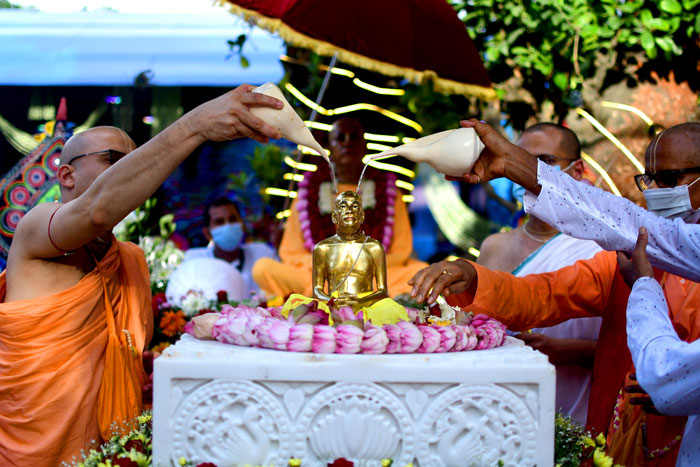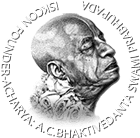A Short Biography of Srila Prabhupada
His Divine Grace A.C. Bhaktivedanta Swami Srila Prabhupada is the Founder-Acharya of International Society for Krishna Consciousness (ISKCON) which brought a spiritual dimension to the lives of thousands of his followers. He was a rare personality who appeared on the earth and dedicated his life to spreading God consciousness all over the world.
The scriptures recommend the chanting of the holy name of Lord Krishna (Harinama sankirtan) as the devotional practice best suited for the present age for spiritual perfection. Sri Chaitanya Mahaprabhu who appeared over 500 years ago in West Bengal, India was the greatest exponent of this method. He predicted that His message will be carried to every town and village of this world by a powerful spiritual ambassador. The life and activities of Srila Prabhupada prove beyond doubt that he was the empowered personality who appeared to fulfil this prediction.
When His Divine Grace A.C. Bhaktivedanta Swami Srila Prabhupada entered the port of New York City on September 17, 1965 few Americans took notice — but he was not merely another immigrant. He was on a mission to introduce the ancient teachings of Vedic India into mainstream America. Before Srila Prabhupada passed away on November 14, 1977 at the age of 81, his mission proved successful. He had founded the International Society for Krishna Consciousness (ISKCON) and saw it grow into a worldwide confederation of more than 100 temples, ashrams and cultural centers.
Srila Prabhupada was born Abhay Charan De on September 1, 1896 to a pious Hindu family in Calcutta. As a youth growing up in British-controlled India, Abhay became involved with Mahatma Gandhi’s civil disobedience movement to secure independence for his nation. It was, however, a 1922 meeting with a prominent scholar and religious leader, Srila Bhaktisiddhanta Sarasvati, which proved most influential on Abhay’s future calling. Srila Bhaktisiddhanta was a leader in the Gaudiya Vaishnava denomination, a monotheistic tradition within the broad Hindu culture, and asked Abhay to bring the teachings of Lord Krishna to the English-speaking world. Abhay became a disciple of Srila Bhaktisiddhanta in 1933, and resolved to carry out his mentor’s request. Abhay, later known by the honorific A.C. Bhaktivedanta Swami Prabhupada, spent the next 32 years preparing for his journey west.
In 1965, at the age of sixty-nine, Srila Prabhupada travelled to New York City aboard a cargo ship. The journey was treacherous, and the elderly spiritual teacher suffered two heart attacks aboard ship. Arriving in the United States with just seven dollars in Indian rupees and his translations of sacred Sanskrit texts, Srila Prabhupada began to share the timeless wisdom of Krishna consciousness. His message of peace and goodwill resonated with many young people, some of whom came forward to become serious students of the Krishna tradition. With the help of these students, Srila Prabhupada rented a small storefront on New York’s Lower East Side to use as a temple. On July 11, 1966, he officially registered his organization in the state of New York, formally founding the International Society for Krishna Consciousness.
In the eleven years that followed, Srila Prabhupada circled the globe 14 times on lecture tours, bringing the teachings of Lord Krishna to thousands of people on six continents. Men and women from all backgrounds and walks of life came forward to accept his message, and with their help, Srila Prabhupada established ISKCON centers and projects throughout the world. Under his inspiration, Krishna devotees established temples, rural communities, educational institutions, and started what would become the world’s largest vegetarian food relief program. With the desire to nourish the roots of Krishna consciousness in its home, Srila Prabhupada returned to India several times, where he sparked a revival in the Vaishnava tradition. In India, he opened dozens of temples, including large centers in the holy towns of Vrindavan and Mayapur.
Srila Prabhupada’s most significant contributions, perhaps, are his books. He authored over 70 volumes on the Krishna tradition, which are highly respected by scholars for their authority, depth, fidelity to the tradition, and clarity. Several of his works are used as textbooks in numerous college courses. His writings have been translated into 76 languages. His most prominent works include: Bhagavad-gita As It Is, the 30-volume Srimad-Bhagavatam, and the 17-volume Sri Caitanya-caritamrita.
His Divine Grace A.C. Bhaktivedanta Swami Prabhupada was a pure devotee of Lord Krishna and a bona fide spiritual master in the Gaudiya Vaishnava Sampradaya. He translated into English three major texts – Bhagavad-gita, Srimad-Bhagavatam and Sri Chaitanya Charitamrita that contain the essence of Vedic knowledge. He also wrote a number of other books that explain in detail the philosophy of Krishna consciousness. Srila Prabhupada’s books have been translated into more than 110 languages and they are known for their authoritative presentation of Vedic knowledge with depth, clarity and lucidity. They have earned the appreciation of scholars from different universities around the world. Srila Prabhupada wanted his books to be widely published and distributed everywhere.
Srila Prabhupada gave the essence of Vedic knowledge to the world in its pure form and true spirit as passed down in the Gaudiya Vaishnava Sampradaya. He taught that Lord Krishna is the Supreme Personality of Godhead and all other jivas are His parts and parcels. The ultimate spiritual perfection of every jiva is to re-establish his relationship with the Lord and engage in His loving devotional service (bhakti) unconditionally. The easiest and the most sublime path to attain this in the present age, as recommended in Vedic literatures is the congregational chanting of the Hare Krishna maha-mantra. It is the yuga-dharma of Kaliyuga. This in conjunction with other methods of bhakti-yoga such as Deity worship, reading the holy scriptures, etc., will enable one to get liberated from the cycle of birth and death and go back to the spiritual abode of the Lord. We request you to read Srila Prabhupada’s books for a detailed study of his teachings.
Srila Prabhupada showed by his own words and deeds the true merits of an acharya. He holds a unique position in the history of Vaishnavism. With unflinching devotion to Lord Krishna and His holy name and a firm determination to carry out the order of his spiritual master, he spread Krishna consciousness all over the world in his advanced age in just a span of 12 years – an unprecedented task in the history of mankind. He established 108 Krishna temples in major cities around the world. Thousands of people were inspired by his books, lectures, conversations, letters, etc., and became his disciples, giving up their sinful life. The Bhaktivedanta Book Trust, founded by him is now the world’s largest publisher of Vedic literature. His writings constitute a veritable library of Vedic philosophy, religion, literature, and culture. These are just some of the glorious deeds of this great divine personality which cannot be described fully.
Childhood in Calcutta
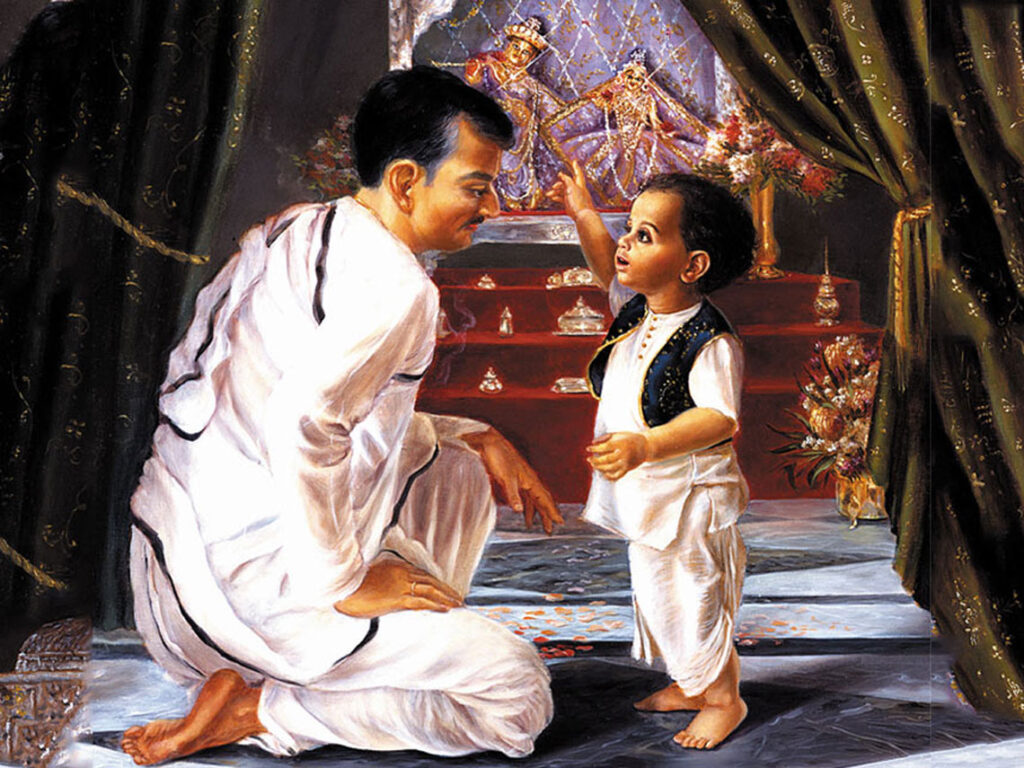
On September 01, 1896, the day after Janmashtami (the auspicious appearance day of Lord Sri Krishna) in a little house in the Tollygunge suburb of Calcutta, a male child was born. His father, Gour Mohan De, and his mother Rajani, named him Abhay Charan (one who is fearless – having taken shelter at the lotus feet of Lord Krishna).
An astrologer prepared the horoscope for the baby and revealed: When this child reaches the age of seventy, he will cross the ocean, become a great teacher of religion and establish 108 Krishna temples. And this is exactly what happened.
Srila Prabhupada set out to America in 1965 and established the International Society for Krishna Consciousness at the age of sixty-nine. He travelled around the world fourteen times, established more than 100 temples of Krishna and initiated more than 10000 disciples into Krishna consciousness.
Srila Prabhupada always spoke of his early childhood with great fondness. Here we give excerpts from some of his books, lectures and conversations where he recalls his childhood.
My father was a pure devotee of the Lord, and when I was only four or five years old, he gave me a couple of forms of Radha and Krishna. In a playful manner, I used to worship these Deities along with my sister, and I used to imitate the performances of a neighboring temple of Radha-Govinda. By constantly visiting this neighboring temple and copying the ceremonies in connection with my own Deities of play, I developed a natural affinity for the Lord.
I remember when I was only about one year old, there was a great sankirtana in our house and I also joined the dancing party. And I was seeing up to their knees, very small. So I remember those days.
In Calcutta there was a very virulent type of plague epidemic in 1898. So Calcutta became devastated. All people practically left Calcutta. Daily hundreds and hundreds of people were dying. I was one year old or one and a half years old. So one babaji, he organized sankirtana, Hare Krishna sankirtana all over Calcutta. And in the sankirtana, all people, Hindu, Muslim, Christian, Parsi, everyone joined. And they were going road to road, street to street, entering in every house. So the plague subsided. This is a fact. Everyone who knows history of Calcutta, know that the plague was subsided by sankirtana movement.
In my childhood, when I was one and one-half years old, I suffered from typhoid, and the Dr. Karttika Candra Bose, he said, “Please give him chicken juice.” So my father refused: “No, no, we cannot.” “No, no he has to be given. Now he has become very weak.” “No, no, I cannot allow.” “Don’t mind, I shall prepare in my own house and send. You simply…” So it was sent from his (doctor’s) house, and when it was given to me, immediately I began to vomit. And my father threw it away, and when the doctor asked that this was the… “No, no, then don’t bother.”
My father’s income was, utmost, three hundred rupees. So we were not very rich men. But we had no want. Father was maintaining his family, getting children married, distributing the wealth. Everything very nice. And we never felt any want. In this mango season, because father saw to it that “There must be a full basket of mangoes daily for the children,” so we were jumping, playing and eating mangoes.
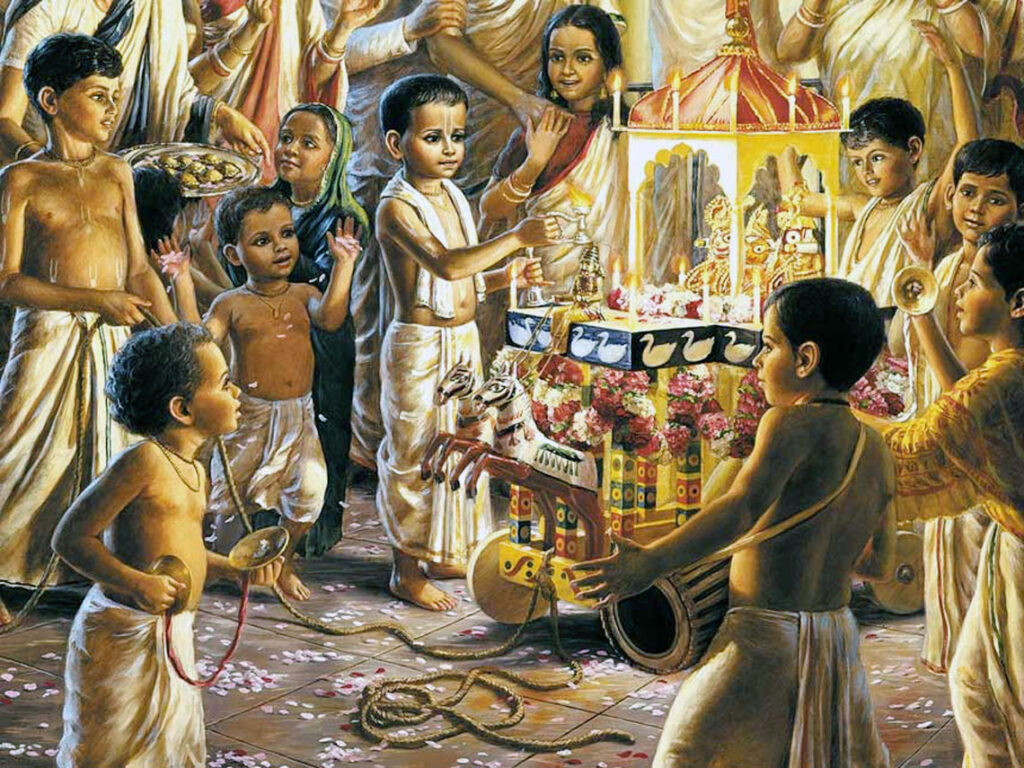
When I was six years old my father gave me a ratha and encouraged to observe functions such as the Ratha-yatra and Dola-yatra ceremonies. I was performing the Ratha-yatra in my neighborhood. He used to spend money liberally for distributing prasada to us children and our friends. I received this training from the very beginning. Somehow or other I had this spark of Krishna consciousness, and my father detected it.
I am very much indebted to my father, for he took care of me in such a way that I became perfectly Krishna conscious. He taught me how to play the mridanga drum. My mother was against. There were two teachers: one for teaching me A-B-C-D, and one for teaching me mridanga. The first one was waiting and the other teacher was teaching me how to play on mridanga. My mother would be dissatisfied. She was angry that “What is this nonsense? You are teaching mridanga? What he will do with this mridanga?” But my father would say, “No, no, he must learn a little mridanga.”
My father used to receive many saintly persons at our home, and to every one of them he used to say, “Kindly bless my son so that he may become a servant of Radharani [Lord Krishna’s eternal consort].” That was his only ambition. He wanted me to be preacher of Bhagavata, Srimad Bhagavatam, and player of mridanga and to become servant of Radharani. Every parent should think like that; otherwise one should not become father and mother. If due to past pious activities one gets a good father and mother, that is a great chance for advancing in Krishna consciousness. I am very much indebted to my father, and I have dedicated my book, Krishna Book, to him.
Meeting his Spiritual Master
Srila Prabhupada became a student of philosophy at the Scottish Churches’ College in 1916. It was a prestigious college. In 1918, when he was in the third year of his college, his father Gour Mohan De got him married to Radharani Datta.
In 1920, Mahatma Gandhi announced the non-cooperation movement, to fight against the British through non-violent means. The call was to give up English education, English court and English-manufactured goods.
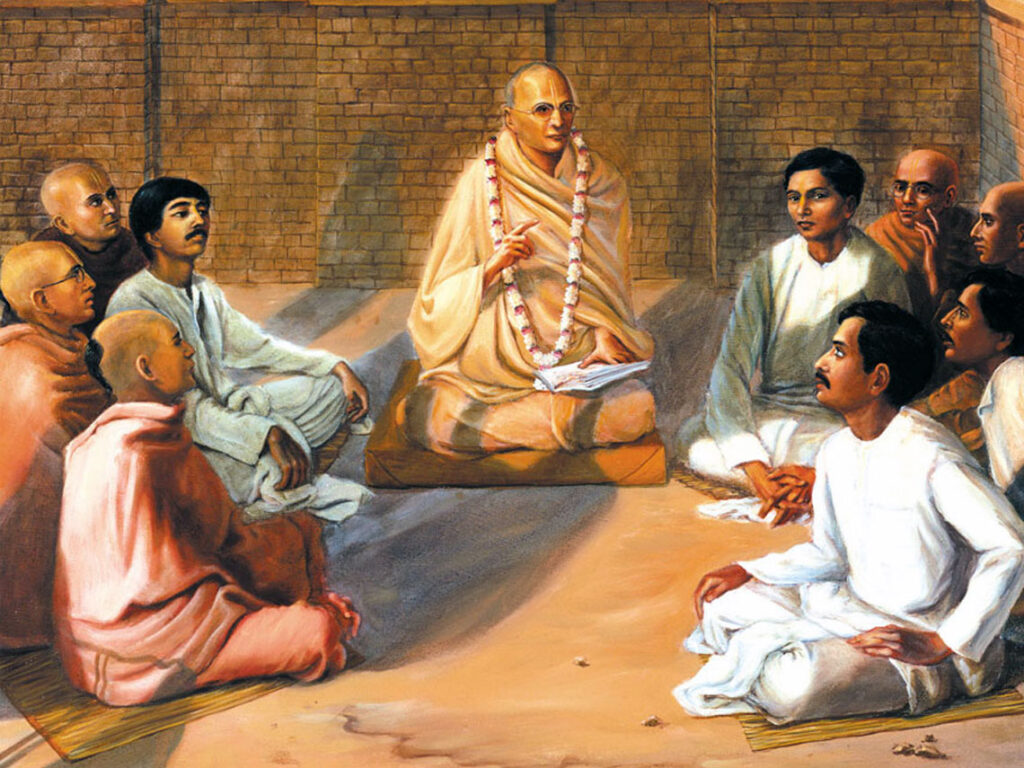
Many people accepted his call and joined the movement. Influential leaders surrendered their honorary posts and titles. Motilal Nehru, Rajendra Prasad, C.R. Das, Vallabhbhai Patel, and C. Rajagopalachari were some of them. Motilal Nehru, the father of Jawaharlal Nehru was a very rich lawyer earning $500 every day. Mr. C. R. Das, another lawyer, was earning $50,000 every month. They renounced everything and joined Gandhi’s movement.
Gandhi appealed to his countrymen to reject all foreign cloth and wear only khadi produced from India’s own cottage industry. He organized public meetings and asked people to come forth and reject their imported cloth. On the spot, people would throw down heaps of foreign cloths, and set them ablaze in a great bonfire. Students came out of the government educational institutions.
Abhay Charan was one of the students who gave up his English education and joined Gandhi’s movement. He started wearing khadi. But in 1922, Abhay Charan met his spiritual master, Bhakti Siddhanta Sarasvati Gosvami Prabhupada and this changed the course of his life.
A close friend of Srila Prabhupada, Narendranath Mullik, insisted he come and meet a sadhu from Mayapur. Initially, Srila Prabhupada was reluctant to go. There were many bogus sadhus and Srila Prabhupada had very bad experience with them. But his friend insisted. Together they entered the ashrama where, sitting with his back very straight, they found Srila Bhaktisiddhanta Sarasvati, a studious looking man wearing sannyasa robes and small round spectacles.
Srila Prabhupada and his friend both bowed down on the floor before him. While the two young men were still rising and preparing to sit, and before any introduction had occurred, Srila Bhaktisiddhanta immediately said to them: You are educated young men. Why don’t you preach the message of Krishna all over the world?
Srila Prabhupada could hardly believe what he had just heard. They had not even exchanged any words, yet this sadhu was telling them what they should do. He asked him: But who will hear your message, so long as we are a dependent country? First India must become independent. How can we spread our Indian culture if we are under British rule?
Srila Bhaktisiddhanta replied in a quiet, deep voice: The message of Krishna cannot wait for a change in Indian politics. It is not dependent on who ruled. The teachings of Bhagavad-gita are so important – so exclusively important – that it cannot wait.
Walking away from the ashrama Narendranath asked Abhay: What is your impression? What do you think of this sadhu?
Srila Prabhupada replied: The message of Bhagavad-gita is in the hands of a very expert person.
Srila Prabhupada accepted Bhakti Siddhanta Sarasvati Gosvami Prabhupada as his spiritual master immediately and in 1933 he took formal initiation from him.
Preaching the message of Krishna
After taking initiation from Srila Bhaktisiddhanta Sarasvati Thakura, Srila Prabhupada was contributing to his spiritual master’s mission by donating money as he was doing earlier, but now he wanted to do more to please his spiritual master. He could not give up family commitments and take sannyasa. He wrote to Bhaktisiddhanta Sarasvati Thakura in December 1936 humbly asking if he could offer some more direct service. He received a reply on December 31, 1936. His spiritual master had already passed away two weeks before the letter arrived. Srila Prabhupada opened the letter. To his astonishment, the letter reiterated the same order he had been given in 1922 when he had first met his spiritual master: You try to preach whatever you have learned from me to the English-speaking people of the world. That will be good for you and for the people to whom you preach. That is my instruction to you. Srila Prabhupada took this as the final order from his spiritual master. He decided to make it his life’s mission.
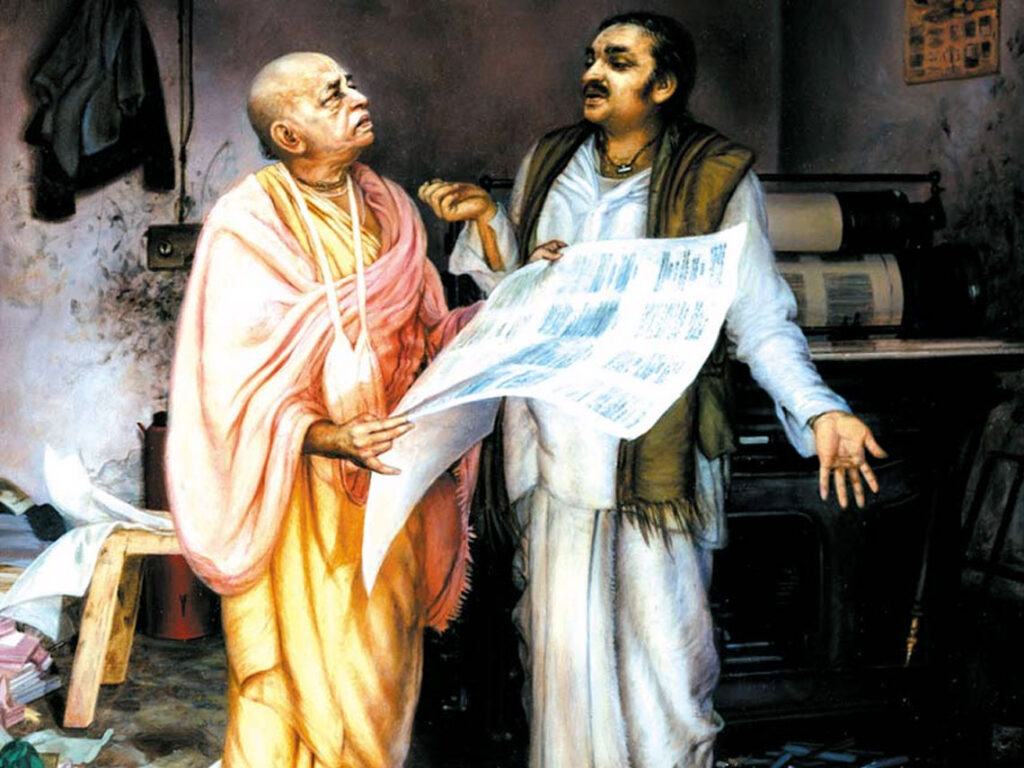
In the years that followed, Srila Prabhupada wrote a commentary on the Bhagavad-gita, continued assisting Gaudiya math in its work and in 1944, started Back to Godhead magazine. This magazine was dedicated to persuading the general public that material life was not the only reality, and that they should be preparing themselves for the real goal of life, which was to return back to the spiritual world and rejoin their original loving father, Sri Krishna. Maintaining the publication was a great struggle. Single-handedly, Srila Prabhupada wrote the material, edited it, typed the manuscripts, checked the proofs and even distributed the individual copies.
In 1944, during second world war, there was an acute shortage of paper and the Government of India refused to sanction paper for printing the Back to Godhead magazine. Srila Prabhupada wrote thrice to the Government asking permission for the continuance of publication of the magazine, and the third attempt was successful. The Government sanctioned papers for publishing Back to Godhead magazine.
Most of the people were not interested in spiritual life. Even his wife and other family members had little or no interest in his mission. Srila Prabhupada started spending more and more time away from home trying to carry out his preaching duties. With great effort he established a center in Jhansi called The League of Devotees, but the members were not very active and later he had to close it down.
Srila Prabhupada decided to retire from family life and move to the holy land of Vrindavana, the place where Lord Krishna displayed His childhood pastimes. He lived in a very humble and austere way in the historic medieval temple of Radha Damodara. He had no income now, and thus ate little, wore old cloth and spent years in deep study and writing. He did not care for his own comforts. He collected money only to print books. In 1959, he took sannyasa and a year later he started his work on a multi-volume annotated translation of the eighteen-thousand verse Srimad Bhagavatam. He also wrote a book Easy Journey to Other Planets. As the years passed, he formulated a plan to spread the chanting of Hare Krishna throughout the world.
Journey to America
A few days before his sixty-ninth birthday, Srila Prabhupada set out for America. He got a free ticket to travel to New York from the proprietor of Scindia Steamship Company, Smt. Sumati Morarji. He was the only passenger on board that small weathered cargo ship named Jaladuta. In his possession were a suitcase, an umbrella, a supply of dry cereal, about seven dollars’ worth of Indian currency (approximately Rupees Forty) and several boxes of books.
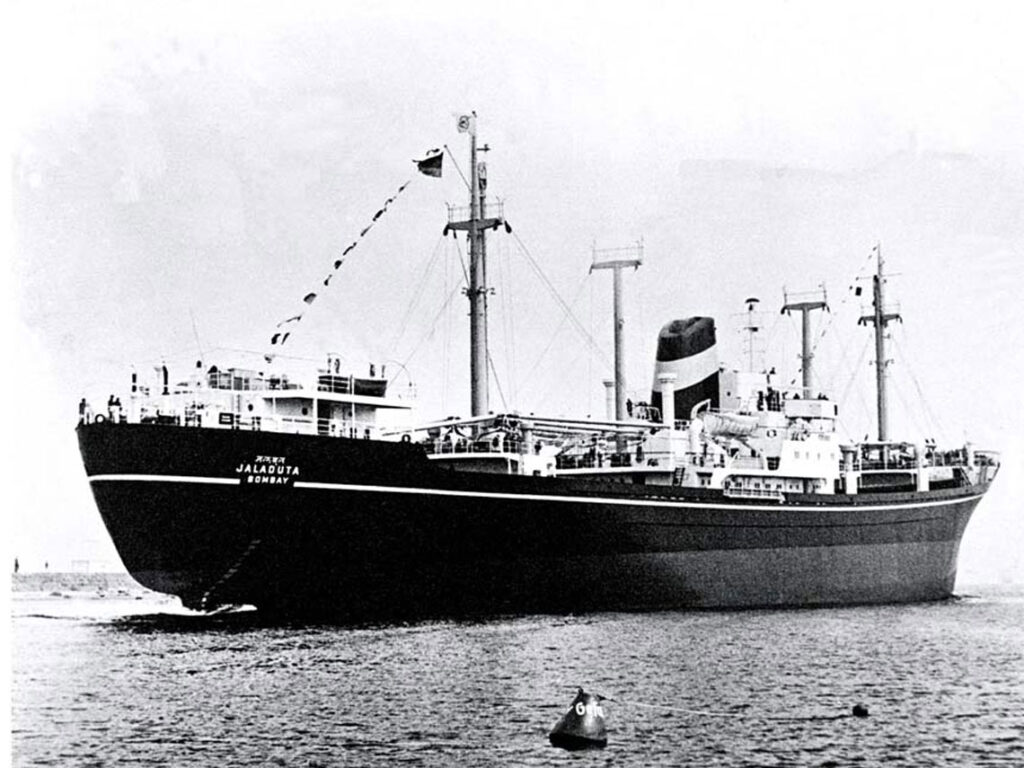
The Jaladuta, under the command of Captain Arun Pandia, whose wife was also aboard, left at 9 A.M. on Friday, August 13, 1965. Srila Prabhupada sat in his stuffy cabin which rolled back and forth with the motion of the sea. He suffered from sea sickness, dizziness and vomiting. He also had two heart-attacks but survived by the mercy of Lord Krishna.
When the Jaladuta arrived in New York Harbor thirty-seven days later, Srila Prabhupada was utterly alone. He had come to America knowing no one, with absolutely no visible means of support, and with only the meager handful of possessions he had carried on board the ship. He had no money, no friends, no followers, not his youth, good health or even a clear idea of how he would accomplish his far-reaching objective to present the spiritual knowledge of the Vedas to the entire Western society.
Several years later, a disciple discovered the diary Srila Prabhupada had kept during his passage from India on the steamship Jaladuta. (This diary is available in the form of an e-book: The Jaladuta Diary.) Inside was a poem, handwritten in Bengali, that Srila Prabhupada had written on board the ship just after it had arrived in Boston harbor. The poem beautifully captures Srila Prabhupada’s first impressions of Western civilization and reveals his heartfelt determination to change the consciousness of America.
Srila Prabhupada expressed his humble faith in Lord Sri Krishna and the special instruction of his spiritual master, who had instructed him to spread the teachings of Krishna consciousness throughout the English-speaking world.
My dear Lord Krishna… How will I make them understand this message of Krishna consciousness? I am very unfortunate, unqualified and the most fallen. Therefore, I am seeking Your benediction so that I can convince them, for I am powerless to do so, on my own. I am sure that when this transcendental message penetrates their hearts, they will certainly feel engladdened and thus become liberated from all unhappy conditions of life.
This poem was written on September 18, 1965. Just twelve years later, on November 14, 1977 Srila Prabhupada passed away in Vrindavana, India, at the age of eighty-one. What did Srila Prabhupada accomplish during this brief period, having begun with nothing and at an age when most are ready to retire?
The Prophecy Fulfilled
After arriving in New York city in September 1965, Srila Prabhupada struggled alone for a year to establish the Krishna Consciousness movement. He lived simply, lectured whenever and wherever he got an opportunity, and gradually began to attract small interest in his teachings. On February 2, 1966, he bought a reel-to-reel tape recorder for $54.02. On February 19 and 20, he recorded his Introduction to Gitopanishad. In July of 1966 Srila Prabhupada founded a spiritual society intended for worldwide participation. He called it the International Society for Krishna Consciousness (abbreviation: ISKCON). At the time of incorporation, Srila Prabhupada had not attracted even one committed follower.
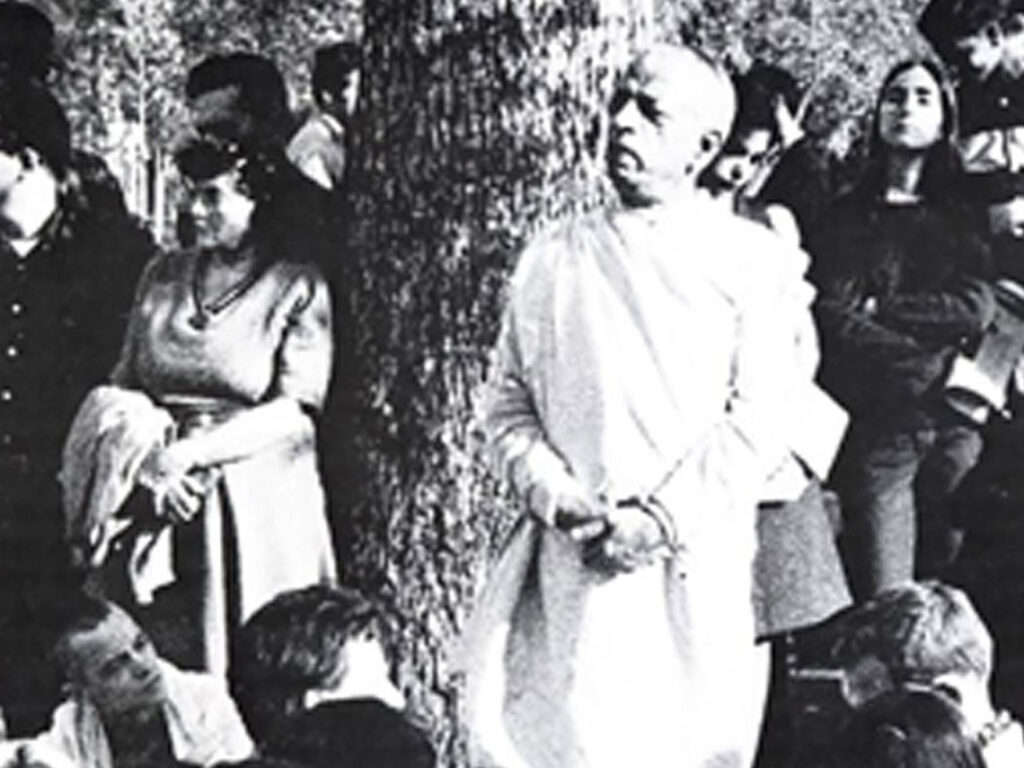
In New York’s Tompkins Square Park, under a big tree, Srila Prabhupada chanted the Hare Krishna mantra and slowly many people joined him in his kirtana. This tree is still preserved as a monument and is considered to be of spiritual significance. In a storefront in the Second Avenue (New York) Srila Prabhupada conducted classes on the Bhagavad-gita. One of the early visitors of Srila Prabhupada in the storefront was Allen Ginsberg, the famous poet. Allen had been captivated by the Hare Krishna mantra several years before, when he had first encountered it at the Kumbha-mela festival in Allahabad, India, and he had been chanting it often ever since. When he heard about Srila Prabhupada, he came to the storefront to meet him.
On September 8, 1966 Srila Prabhupada conducted the first initiation ceremony in the storefront. By 1967, Srila Prabhupada was ready to expand his mission beyond New York to San Francisco, Los Angeles, Boston, Buffalo and then on to other countries. He sent his disciples to London where contact was made with George Harrison from the pop group – The Beatles. George Harrison became very interested and he released a record of chanting which reached the number one position in the UK popular music charts. This exposed millions of people to the maha mantra, and greatly pleased Srila Prabhupada who flew into London and personally met George. Later George donated a large manor house in the English countryside to the movement.
Srila Prabhupada established various Vedic schools, called gurukulas, where children were trained in Krishna Consciousness from a very early age. He set up cow protection programs on several of his larger projects to care for cows and bulls even after their productive lives were over. He set up an academy of artists who painted fabulous devotional artworks for his books. He also established the Bhaktivedanta Institute made up of disciples, expert in science and mathematics, whose mission was to disprove various atheistic theories and disseminate Vedic knowledge. He wrote scores of books and initiated thousands of disciples. He travelled from continent to continent, country to country, city to city, town to town, preaching the message of Krishna. He arranged for massive food distribution programs. Millions of free plates of vegetarian foodstuffs spiritualized by offering to Krishna have been distributed to needy people around the globe.
Thus Srila Prabhupada fulfilled the prophecy of Lord Chaitanya. All over the world the words Hare Krishna Hare Rama have been heard on the streets, at festivals, on the radio and on television. The holy names have gone to every town and village. It was Srila Prabhupada’s faith and devotion that brought about this colossal transformation.


